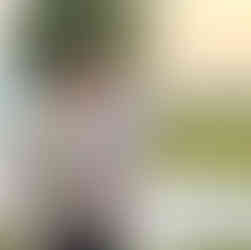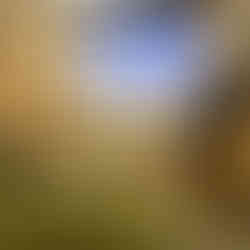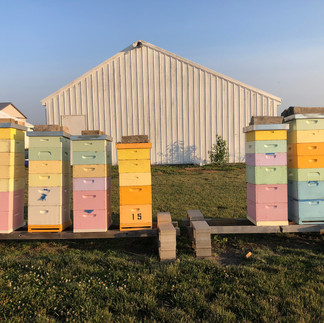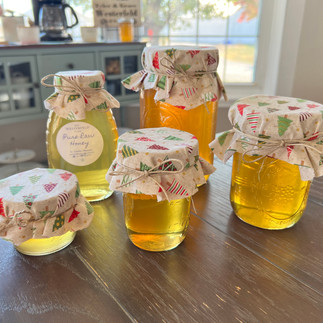
The plot of land I call home, for my family and our business, has seen a lot over the past 80 years. Just east of the Mississippi River, this land has seen floods and droughts. It has seen livestock and row crops. It gets its fair share of bikers, school commuters, and river traffic. Now, it even has bees.
My wife and I were fortunate enough to be able to purchase my family's farmhouse in April of 2021. I am the 4th generation to call this house home, with the 5th generation now running about yelling “mamma” and “dadda” any chance he gets. My great grandfather built our house in the late 40s. My grandfather remodeled and added an addition in the early 70s. After having 18 inches of water on the main floor of the house from the flood of ‘93, it was gutted and remodeled again. Now, I feel truly blessed to get to raise my family here.
Though what began 80 years ago as a full-time farming operation for my great grandfather, my grandfather transitioned to farming during the summer while doing carpentry work in the winter. Now, my father and uncle take care of the farming while also running their own construction companies. Though I am proud of the farm and the history it holds, I felt the desire to try something unique that could be my own. Enter honeybees.
After graduating college in 2019, I began to read every book the St. Charles library had about bees. Then, with some mild convincing, I was able to get my fiancé —now wife—on board, and we took a beginners beekeeping course with Three Rivers Beekeepers, a St. Charles County based beekeeping club. This is when our journey as beekeepers truly began.
After attending the beginners course, we ordered starter hives—called nucleus colonies—from another member of Three Rivers. We drove to Chillicothe, Mo. to purchase our beehives and equipment from a beekeeper there who makes—or locally sources—all of his beehives. We set up our apiary, planted some flowers, and tested out all of our equipment while we waited for our hives to be ready.
One Saturday morning in May of 2020, we borrowed my Father-in-Laws pickup truck, packed our veils, and headed to pick up the bees. Thankfully, we were able to get our nucs home and transitioned into their hives smoothly, and our first summer as beekeepers truly began.
I consider that first summer to have been in and of itself a learning course, because there is no better way to learn than from hands-on experience. We were stung, we had swarms, we made mistakes and learned from them—but in the end, our two hives produced 60 pounds of the best honey we’ve ever tasted. It was delicious, and we were hooked.
After a successful inaugural season, we were fully consumed by the joys of beekeeping. The following spring, we purchased two hives from a retiring beekeeper and made a few new colonies by splitting our own hives, taking our number of colonies from two to seven. 2021 was another successful year for the bees, with four colonies producing 400 lbs of honey.
While I love honey, this was more than I could eat on my own. In order to sell some honey to help pay for the cost of the bees and equipment, we decided to start a small business and formed Westerfeld Bee Farm, LLC. Primarily selling through our beekeeping Facebook page, we sold out of our honey that November.
In 2022 we increased our number of hives again from seven to ten by splitting our colonies in the spring. Splitting hives is a way to increase your number of hives, and is a method to prevent bees from swarming. 2022 was very dry, but the bees blessed us with another great season. We had seven hives produce 1100 pounds of honey. In addition to selling through our Facebook page, we partnered with La Belle Vie—the Cafe at Frenchtown. La Belle Vie uses only our local honey in their coffees and teas. The demand for honey remained strong, and we sold out in January of 2023.
2023 was a year for the record books for Westerfeld Bee Farm. By splitting our hives and catching two local swarms, we increased our apiary to 15 hives. The weather again trended very dry, with rainfall very scattered. Conditions must have been ideal for the bees though, as we had 12 hives produce 2,100 lbs of honey! A literal ton!
As the excitement around a record harvest wore off, worry started to creep in. How in the world would we ever sell a ton of honey? We are very thankful to be able to find some great partnerships with some amazing local businesses. You can now find our honey for sale at La Belle Vie, Whistle Stop 301 in St. Peters, Blooming Daisy Marketplace in Cottleville and still direct through our Facebook page.
As I write this looking ahead to the 2024 beekeeping season, I can safely say there are no expansion plans on the horizon. 2023 pushed me to my limits trying to balance my engineering career, a young family and the bees. I hope to maintain 12-15 honey producing colonies each year, and aim to produce as much honey as I can. The honey sales go right back into the business for purchasing better equipment, making my bee work more efficient and allowing me to spend more time with my family.
I am still a few years off from getting any free labor from my son in the bee yard, but I do hope to share this hobby with him as he gets older. Similar to what has been passed down through farming, I hope beekeeping can help show my son how to work hard, learn from your mistakes, and enjoy what you do. While I can imagine the reaction my grandpa would have if he was here for me to tell him that I wanted bees on the farm— “What? Bees? What do you want a bunch of stinging bugs around here”—I hope he looks down and smiles at how the bees have become a way of life on the farm.
To purchase honey from Westerfeld Bee Farm, please visit their FB Page here: https://www.facebook.com/p/Westerfeld-Bee-Farm-LLC-100069770397032/

















